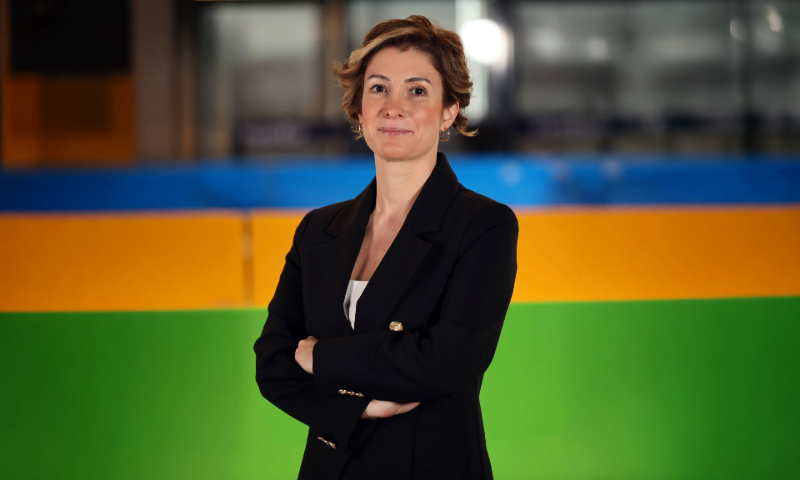Gül Bilgin Mokan is the Deputy General Manager of Customer Experience at Multinet Up. After earning her degree in Industrial Engineering from Gazi University, she studied Business Management in London. She began her career in IT and later worked in the automotive industry. In 2014, she joined Multinet Up, where she led key projects in process development and risk management before focusing on customer experience and digital transformation. She integrated technologies like RPA, AI, Gen AI, No/Low Code systems into customer operations. Mokan has received numerous awards and actively mentors young talents while supporting educational NGOs.
Recently, in an exclusive interview with CXO Magazine, Gül shared insights on what fuels her passion for AI-driven CX and digital transformation, her secret to striking a work-life balance, future plans, words of wisdom, and much more. The following excerpts are taken from the interview.
Hello Gül. What fuels your passion for AI-driven customer experience and digital transformation? How do you stay up-to-date with the latest trends?
The direct and measurable positive impact of artificial intelligence on customer experience is the main source of my passion for this field. When we approach AI as a system that supports humans in decision-making processes, we can see its true potential in customer communication. Typically, when people think of AI, the first thing that comes to mind is chatbot-based ready-response systems. However, I personally find the efficiency we gain from decision support systems much more valuable.
Thanks to natural language processing techniques, we can analyze customer sentiment in both written and verbal communications in real time. It becomes possible to detect dissatisfaction hidden between the lines before a complaint is even voiced. This happens at a speed and scale beyond human capacity. AI enables us not only to diagnose issues but also to generate both individual and systemic solutions. As Multinet Up, we can perform a much deeper experience analysis that goes beyond conventional customer surveys.
Digital transformation today is no longer limited to mobile apps or self-service systems. With generative AI and no-code/low-code platforms, we’re on the brink of an entirely new digital era. These technologies allow us to rapidly implement customer experience-enhancing solutions with our own teams, without being dependent on IT departments. This freedom and speed motivate me more and more every day.

What do you love most about your current role?
What I love most about my role is the ability to develop innovative projects using our internal resources. Within the Multinet Up Customer Experience team, we’ve established an AI and no-code/low-code team, mostly consisting of Gen Z professionals. Through this team, we’re able to understand the voice of the customer more clearly by positioning AI as a decision support system at customer interaction points.
We’ve also integrated generative AI into our bot infrastructure. We actively use large language models (LLMs) to improve the language skills and knowledge levels of our representatives. Tools like RPA and Microsoft Power Platform help us speed up our customer operations and raise quality standards.
This entire process has shown us that our dependency on IT teams has significantly decreased when it comes to improving customer experience. Now we can implement the solutions we need with agility and flexibility through our own internal dynamics. This not only boosts our team’s confidence but also strengthens our passion for our work
How do you envision the future evolution of AI-driven customer experience? What skills will become most essential?
AI-driven customer experience is demanding brand new skill sets for both customer service representatives and experience professionals. It’s not just about natural language processing anymore—being able to analyze customer behavior through machine learning, detect patterns, and forecast trends is becoming crucial. In the future, the ability to extract meaningful insights from big data and turn them into actionable strategies will be at the heart of customer experience projects.
Generative AI makes it possible to offer more natural and human-like responses to customers. At the same time, we’ll see a rise in systems that support representatives in critical human interaction points. These tools will not only provide faster and more personalized experiences for customers but also allow agents to take on more strategic roles. The ability to use no-code and low-code platforms will be one of the keys to this transformation. That’s why I believe professionals who can adapt quickly, are open to learning, and use available tools creatively will stand out.
At Multinet Up, we’ve already initiated this transformation internally. We are training our customer representatives to become individuals who can develop projects using AI and digital tools. Since these technologies are still very new, it’s not easy to find people externally with the required competencies. So we focus on nurturing eager learners within the company. This way, we prepare our talents for the future and manage the transformation faster and more sustainably without relying on external sources.
Do you notice a lack of women in the customer experience field? If so, what do you think causes this?
I don’t believe that women are underrepresented in the field of customer experience. On the contrary, I observe that they play very impactful roles and make a real difference. Customer experience is a domain that prioritizes qualities like empathy, a holistic perspective, and a human-centered approach—traits that naturally align with women’s strengths. However, as the touchpoints with technology increase, I do believe there is a risk of imbalance. Women’s participation in technology projects is still not at the desired level. Over time, this could lead to a decrease in women’s influence in the customer experience field. That’s why I find it essential to involve more female professionals in next-generation technologies like generative AI and no-code/low-code platforms. Otherwise, we risk losing the valuable ground we’ve gained today in the future.

Looking back, which women have had the greatest impact on your career?
First and foremost, I want to mention my mother and my sister. They’ve always been my biggest supporters throughout my education and various stages of life—during both successes and failures. Their belief in me has consistently nurtured my self-confidence and passion for learning.
In my professional journey, the strong female leaders I’ve worked with have had a tremendous impact on me. Female managers I reported to inspired me with their leadership styles and presence. I closely observed not only how they worked but also how they handled interpersonal relationships, and I’ve taken many of them as role models.
Additionally, mentorship from successful female leaders across various sectors has created significant turning points in my career. Sometimes, you can get stuck in similar thought patterns within your own organization, and these outside perspectives gave me a whole new vision.
I’ve also been deeply influenced by women I met through social responsibility projects—women with whom we not only created positive impact but also intellectually enriched one another. I can say that I am who I am today because of all these women who have inspired me at different times in my life.
Lastly, I want to acknowledge all the women who’ve touched my life in any way. Close friends, women I’ve chatted with in passing, relatives I’ve exchanged ideas with… I believe there is something to learn from every woman. Women are the source of life. Each one is a precious treasure—if only we make the effort to truly understand them.
What does the concept of “authentic leadership” mean to you?
To me, authentic leadership is about embracing a new generation of leadership understanding. We can all see that classical leadership models fall short in addressing the needs of the modern world. Daniel Goleman’s books on leadership summarize this transformation well. Today’s teams don’t expect their leaders to plan everything from A to Z or produce all the solutions themselves. Instead, they value leaders who can create environments for collaboration and ignite collective intelligence. I wholeheartedly believe in this approach.
A leader’s primary role is to lay out a clear strategy and keep the team focused around that vision. Additionally, forming inclusive teams and facilitating healthy discussions are vital parts of leadership. Of course, ensuring that these environments are sustainable by equipping the team with the necessary skill sets is also the leader’s responsibility.
I also believe a leader should be intellectually well-rounded. Following art, literature, technology, and current trends broadens a leader’s perspective and helps inspire their team. These areas serve as powerful compasses for forecasting the future. When a leader navigates using these compasses, the team naturally completes the journey with success.
What’s your secret to maintaining work-life balance?
I can’t say I had a good work-life balance in the early stages of my career. But as I focused on developing my leadership skills, my teams grew stronger and my workload became more manageable. Of course, that alone isn’t enough. A strong social life is one of the most important elements in maintaining balance.
Peter Drucker’s quote has always inspired me: “If you were to advise a management group on how to be more successful at work, what would you suggest?” The answer: “Learn to play the violin.” This perspective perfectly illustrates how skills we gain in our personal lives help balance professional intensity and develop leadership competencies.
Personally, I’ve found balance through meaning-making pursuits beyond just work. I actively participate in social responsibility projects. Especially mentoring students and volunteering in women leadership solidarity programs have offered me incredible opportunities for human growth. They’ve also helped me manage my time more consciously and productively.
And I can clearly say this: when you stop seeking all meaning in your career, your ambitions decrease, your risk of making mistakes lessens, and your inner peace grows. This awareness forms the true foundation of work-life balance.

Where do you see yourself in five years?
With the transformation initiated by AI, especially generative AI and no-code/low-code systems, I aim to deepen my expertise and lead impactful projects in this field. However, I don’t want this accumulated knowledge to remain limited to the organization I work for.
In the future, I plan to build a knowledge and experience hub to support different organizations in strengthening their positions in a competitive landscape. I don’t yet have a defined format—this could be a consultancy service, a book, a blog series, or keynote speeches. Maybe all of them. But one thing is clear: my purpose in life is to grow through shared learning. I don’t want my insights and experiences to remain just mine. The more people I can share them with, the more people I can inspire, the more valuable it feels. I truly believe in the magic of growing together.
What advice would you give to someone who wants to enter the field of AI-powered customer experience?
Anyone looking to enter the field of AI-driven customer experience needs to embark on a multifaceted learning journey without ever losing their sense of curiosity. AI is not just a technical subject—it also involves understanding customer behavior, analyzing data, and crafting meaningful experiences from those insights.
My first advice would be to understand the core dynamics of the field. Then, consider how to adapt that knowledge to your own industry or way of working. Following sources like Harvard Business Review, thought leaders on LinkedIn, and industry events regularly will be very beneficial. This way, you not only stay informed but also gain a deeper understanding of the direction the sector is heading.
Also, hands-on experience is just as important as theoretical knowledge. Access to information is easier and more affordable than ever. Platforms like Udemy, Coursera, and YouTube offer quality content. But what truly makes a difference is how you apply what you learn. Even a micro project that improves a process based on a small insight can make a big impact. It doesn’t have to be a grand initiative—sometimes, a simple automation can create real value.
Lastly, I’d say this: it’s very difficult to ever feel “fully ready” in this field. Technology is constantly evolving, and in reality, we are all students on this path. So don’t wait for perfection—start with an open mind, be willing to learn, experiment, and grow together. Be brave, stay curious, and don’t be afraid to take the first step.

